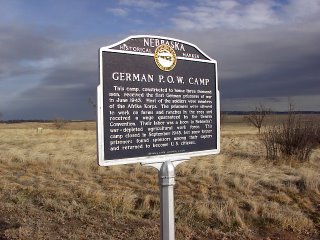 It may be hard to believe, but thousands of German prisoners of war were interred on U.S. soil beginning in 1943.
It may be hard to believe, but thousands of German prisoners of war were interred on U.S. soil beginning in 1943.Nearly every state in the United States had a POW camp. Camps were hastily built within a matter of months to prepare for the vast influx of German soldiers, most of them from Rommels' Afrika Korps in Northern Africa.
In Fort Robinson, Nebraska, located in the upper northwest corner of the state, German POWs arrived in June of 1943. They stayed until the camp closed in 1946.
For my MA thesis, I focused on the intellectual diversion program implemented by the Office of the War Department. The War Department wished to "re-educate" the German soldiers in democracy.
Although the success of this program has never been fully known, it is entirely possible that it was not a failure. Germany today has moved far beyond the Nazis rhetoric of the 1930's and 1940's. Is it possible that German POW's found a voice when they returned to their country? Further studies need to be done, but sadly, the opportunity to do such studies is slipping away. As the World War II generation disappears, it becomes even more difficult to discover answers to the past.
For more photos of the German POW camp at Fort Robinson, click here.





3 comments:
Yes, we had them here too - they've recently begun work on trying to restore some of the buildings at one of the camps.
I like to think that it did have some impact - I do know that at one camp here (and I don't remember which one - because for some reason I'm thinking there were two in Texas), some of them were even allowed to go out and work in the town (under close guard of course). Friendships were made - and if my addled mind isn't completely gone, I believe that some even came back after the war for visits.
Eve - Yes, a lot of the POWs in Nebraska were used for farm labor since so many men were out fighting. A lot of them came back to visit and I know a few of them even decided to live in Nebraska.
Texas did have more than one POW camp. There is a map of all the POW camps in the United States - if I can find it, I'll share it with you!
Thanks. I'm a little less knowledgeable about the European aspect of WWII. My father was there as were a lot of my uncles, but the only uncle who would share his stories about WWII was the one that fought in the Pacific - so I grew up more interested in that side.
Post a Comment